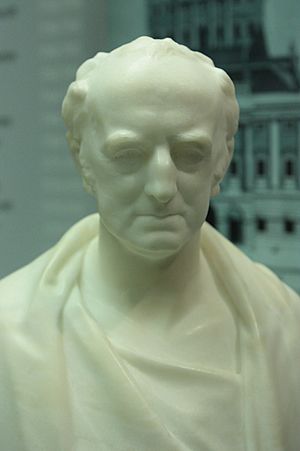William Cotton (banker) facts for kids
Quick facts for kids
William Cotton
|
|
|---|---|

William Cotton by Matthew Noble 1855
|
|
| Born | 12 September 1786 Leytonstone, England, Great Britain
|
| Died | 1 December 1866 Walwood House, Leytonstone, England, United Kingdom of Great Britain and Ireland
|
| Nationality | English |
| Occupation | inventor, merchant, philanthropist, Banker |
William Cotton (born September 12, 1786 – died December 1, 1866) was an amazing English inventor, businessman, and a kind person who helped many charities. He even became the leader of the Bank of England for a few years!
Contents
William Cotton's Journey
Growing Up and Starting Out
William Cotton was born in Leytonstone, England. His father, Joseph Cotton, was a successful sea captain. Joseph worked for the East India Company, which was a very powerful trading company. William's father later became a leader at Trinity House, an organization that helps keep ships safe.
William went to school at Chigwell Grammar School, which was nearby. His brother, John Cotton, also became a director and chairman of the East India Company.
In 1807, William became a partner in a company called Huddart & Co. They made ropes and cords for ships. He later became the general manager of this company. He worked there until 1838.
Leading the Bank of England
William Cotton became the Governor of the Bank of England in 1842. This was a very important job. Usually, a governor served for two years. But William's term was extended to three years. This was because he helped create a new law for the bank. This law was called the 1844 Bank Charter Act.
During his time at the bank, William invented a special machine. This machine could weigh gold coins called gold sovereigns. It was very fast and accurate. It could weigh 23 coins every minute! It was so precise, it could measure tiny differences in weight.
William was also a Fellow of the Royal Society starting in 1821. This is a group of very smart scientists and thinkers.
Helping Others
In 1838, William Cotton served as the High Sheriff of Essex. This was an important local role.
William was also a very generous person. He helped pay for many schools across the country. These schools were part of a network started by Canon Nathaniel Woodard. William also helped fund new churches. These churches were built in the East End of London. He was known for his kindness and desire to help his community.
William Cotton passed away on December 1, 1866. He died at his home, Walwood House, in Leytonstone.
William Cotton's Family
In 1812, William married Sarah Lane. Her father was Thomas Lane from Leyton Grange. William and Sarah had several children who also did important things.
- Their son, William Charles Cotton, became a clergyman. He was also an expert in beekeeping.
- Their daughter, Sarah Acland, was known for her good deeds and charity work.
- Another son, Henry Cotton, became a famous judge.
- Their sixth child, Agnes Cotton, also became a kind person who helped many charities.
 | Audre Lorde |
 | John Berry Meachum |
 | Ferdinand Lee Barnett |

